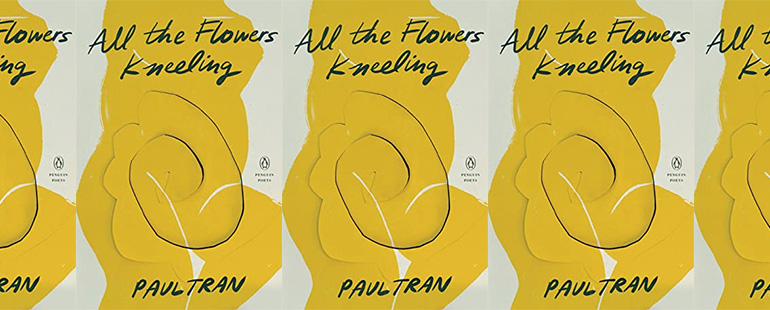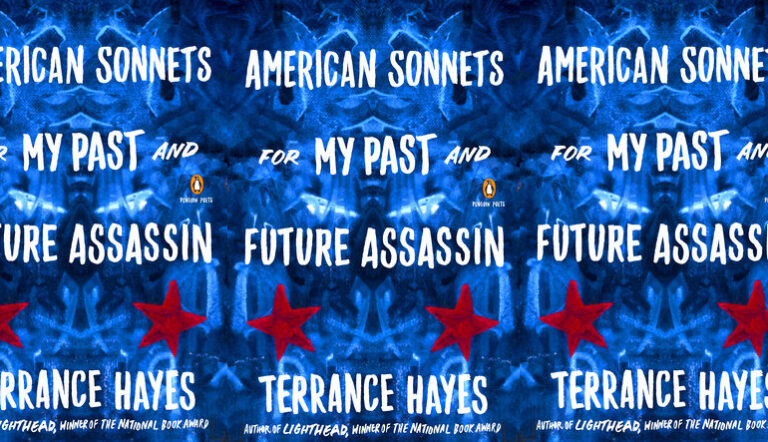States of Unknowing in Paul Tran’s All the Flowers Kneeling

All the Flowers Kneeling
Paul Tran
Penguin Books | February 15, 2022
In Paul Tran’s stunning debut poetry collection, the word “trauma” is never written. Instead, a violent encounter permeates the speaker’s environment, informing their descriptions of visual art, the natural world, and family history, specifically contextualized by the United States’ brutal intervention in Vietnam’s civil war. Survival in the face of bodily harm is everywhere. Here, Tran’s expansiveness is a major strength: the collection refuses to be a linear roadmap, providing the reader instead with a vast exploration of the aftermath of trauma.
Tran’s command of the poetic line is immediately apparent. In an early poem entitled “Incident Report,” they employ terse, end-stopped lines to generate a mood of bureaucratic austerity, writing “I had a form. / The form said Name of victim. / The form named me. The form was a form of naming. Naming gave me form.” Like the work of poets Solmaz Sharif and Layli Long Soldier, this piece and others in the collection subvert hegemonic modalities of language to reveal the ways such systems contain and obscure power. Tran’s speaker becomes nearly automatized and anonymous, highlighting the undue explanatory burden institutions place on survivors of sexual assault. But as the poem ends with two brief sensory memories—a towel that smells of sugar, the sound of an ice cream truck—readers are reminded of the particularities of the speaker’s experience that cannot be reduced to a line on a document.
As seen in “Incident Report,” the entire collection is concerned with examining form in a myriad of ways, crafted with remarkable lyric precision. A standout piece is a crown of fourteen sonnets entitled “Scheherazade/Scheherazade.” The title’s mythological namesake, the protagonist of the collection of Middle Eastern folktales 1,0001 Nights, had to tell stories to save her own life. Tran’s crown builds from this myth, weaving together the speaker’s mother’s memories of America’s military presence during the Vietnam War (“Line of soldiers. / Red sand beach. Red sand with / blood. Waves racing in.”) with moments of self-reflection following their own assault. These latter moments of interiority are written in terza rima, triplets in an ABA BCB CDC rhyme scheme, imbuing the speaker’s thoughts with a fraught narrative music. Of their assailant, Tran writes, “With him I had an audience. Both heads / at attention. Ravenous. A kind of ravishing. Tell me / you like it. I told him I liked it. Tell me how bad / you want it.” Here we see the attention to the ways we perform for others, which runs throughout the collection, as do concerns with storytelling, narrative, and discovery.
In the latter half of the book, Tran probes readers to investigate power outside overtly political institutions, in seemingly neutral locations like classrooms, museums, and labs. In three persona poems titled “Scientific Method,” Tran examines the underbelly of innovation, inhabiting the voices of a cadaver, Rheus monkeys, and creeping plants, all subjects of experimentation. This criticism of mastery over the environment melds with the speaker’s experience of trauma to challenge determinist notions of progress, of improvement and “getting better.” In a poem called “Galileo,” the speaker pushes against the passage of time following their assault, “I couldn’t face it: the world moving on as if nothing happened.” Tran reminds us that forward movement and discovery can be violent and disappointing. Ultimately, this probes readers to think about the failures of our epistemological systems: across several narrative threads, the collection asks us to interrogate what we know about ourselves and the world, and what had to be sacrificed for this knowledge.
The organization of the poems in All the Flowers Kneeling helps accomplish this: across the collection’s four sections, several poems mirror each other, generating a dialogic atmosphere throughout the text. “Incident Report” is followed by “Progress Report,” the Scheherazade series is split between two distinct sections, and the book’s first poem, “Orchard of Knowing,” is reflected its final poem, “Orchard of Unknowing.” Tran chooses to end the collection with an image of immense possibility: the speaker, naked but for a snakeskin coat, is running in the wind. Tran then writes: “The flowers-opened, closed- tell me / things have happened. Are happening. Are about to.” Here, we are gifted an alternate chronology, a queer temporality that favors multiplicity over neat beginnings and endings. Tran’s poems are an antidote to a world that asks us to prioritize progress over reflection, mastery over ambiguity. Their collection is a necessary reminder that states of unknowing, too, are fruitful.


